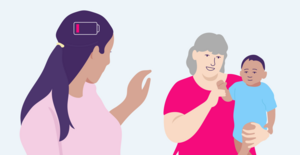Maintaining a healthy and fulfilling relationship can often feel like a daunting task. While love and companionship are vital components of emotional health, it's important to remember that good relationships require ongoing effort and commitment from both partners.
Seeking the guidance of a relationship counselor, also known as couple's therapy, is an invaluable step in strengthening your connection. These professionals offer tools and strategies to help couples navigate challenges, improve communication, and deepen their emotional bond. In this article, we will explore how to find relationship and couples counselors near you, ensuring that you have the support needed to nurture and enhance your partnership.
What is relationship counseling?
Relationship counseling, commonly referred to as “couples therapy", “couples counseling," or "marriage counseling", is a psychotherapy approach aimed at helping partners tackle and settle conflicts in their relationship. This counseling offers a secure and unbiased environment where couples can delve into their emotions, enhance communication, and gain insight into each other's viewpoints.
The primary purpose of seeing a psychologist for marriage counseling is to attend sessions that help individuals work through their conflicts, whether they stem from communication issues, trust problems, or differing values and goals. It’s important for couples to know that therapy is a collaborative process; progress may take time and requires openness and commitment from both partners. Additionally, confidentiality is a key component of therapy, allowing individuals to share their thoughts and feelings without fear of judgment. This process can lead to greater intimacy and a more resilient partnership.
Who needs couples or relationship counseling?
Many couples encounter challenges that can feel overwhelming, and recognizing the need for professional guidance from a couples counselor before divorce is imminent is the first step toward healing mental health and growth. Here are some signs that may indicate it’s time to seek help from a licensed marriage or relationship counseling sessions, according to AARP:
- Frequent Arguments: If you find that disagreements occur regularly and escalate quickly, it may be a sign that underlying issues need to be addressed with the help of a counselor.
- Financial Issues: Disagreements over finances can create a significant strain on a relationship. If money matters are causing stress or conflict, counseling can help couples navigate these discussions and find common ground.
- Desire to Divorce: If one or both partners are contemplating separation or divorce, seeking counseling can provide a space to explore these feelings and assess whether the relationship can be salvaged.
- Co-parenting Issues: Couples who share children may face unique challenges when it comes to co-parenting. Seeing a family therapist for counseling can assist in developing effective communication strategies and parenting plans that benefit the children. Family therapy can be for just the parents, just the children, or for the entire family unit, even step-parents. In fact, this type of therapy is best when all members of the family are involved.
- Desire to Strengthen the Relationship: Even couples who are not experiencing major problems may seek counseling to enhance their connection, improve communication, and build a more resilient partnership.
- Pre-marital or Civil Union Advice: Engaging in counseling before tying the knot can help couples address potential issues, set expectations, and build a strong foundation for their future together.
When to seek professional relationship counseling?
Regardless of which type of therapy you and your partner need, knowing when to seek professional relationship counseling is essential for maintaining a healthy partnership. While some couples may wait until problems escalate and they are on the verge of divorce, it's important to recognize that seeking help can be a proactive measure, especially during significant life changes or ongoing conflicts. Here are some key situations when couples should consider reaching out for professional support:
- Abuse: If there is any form of emotional, physical, or psychological abuse, it is crucial to seek professional help immediately. Safety should always be the top priority, and counseling can provide resources and support for those affected.
- Constant Critique: If one or both partners feel consistently criticized or find themselves wanting to escape the relationship, it may indicate deeper issues that need to be addressed. Counseling can help couples explore these feelings and work toward resolution.
- Major Life Changes: Significant events such as pregnancy, moving, job changes, or the loss of a loved one can put stress on a relationship. Seeking counseling during these transitions can help couples navigate the challenges and adjustments that arise.
- Communication Breakdown: If communication has become ineffective or hostile, and conflicts are frequent, it may be time to seek professional help. A counselor can provide tools to improve communication and foster understanding.
- Loss of Intimacy: If partners notice a decline in emotional or physical intimacy, it can be a sign that issues need to be addressed. Counseling can help couples reconnect and explore underlying concerns.
- Desire for Growth: Even if a relationship seems stable, couples may choose to seek counseling to enhance their connection, address minor issues, or prepare for future challenges. This proactive approach can strengthen the relationship and promote resilience.











